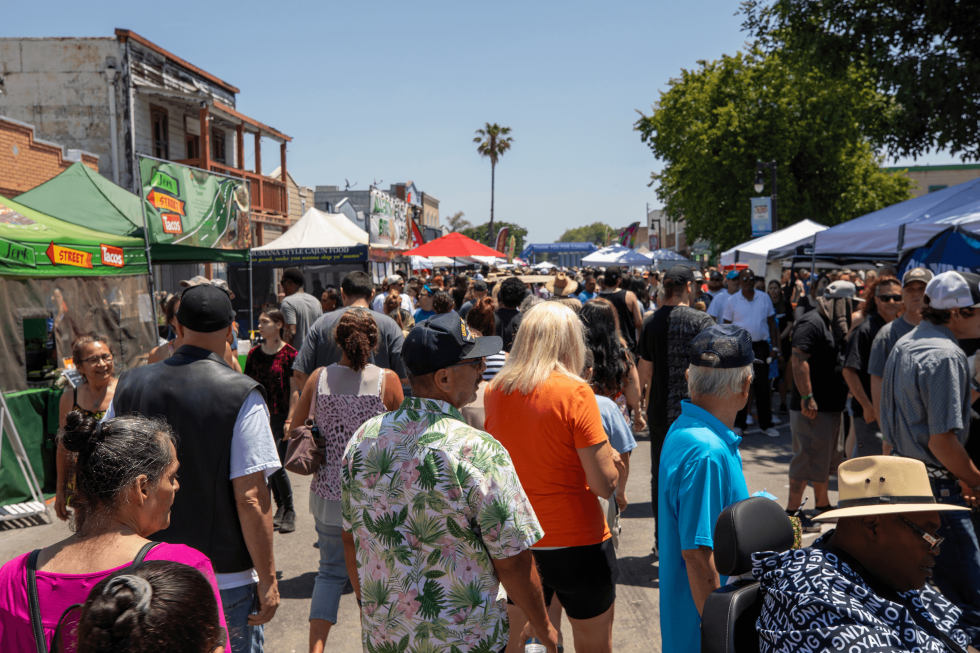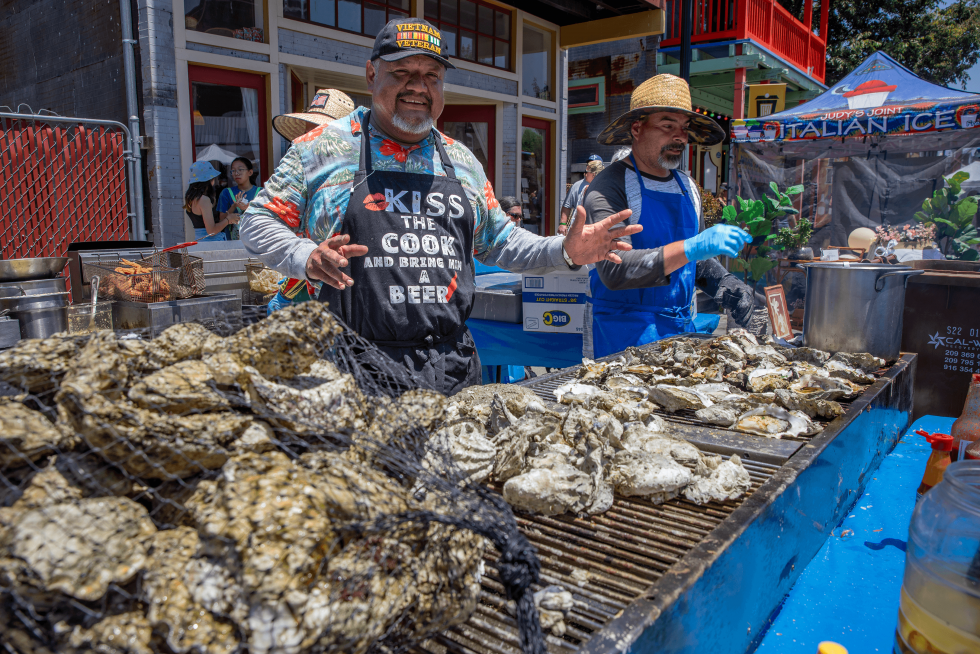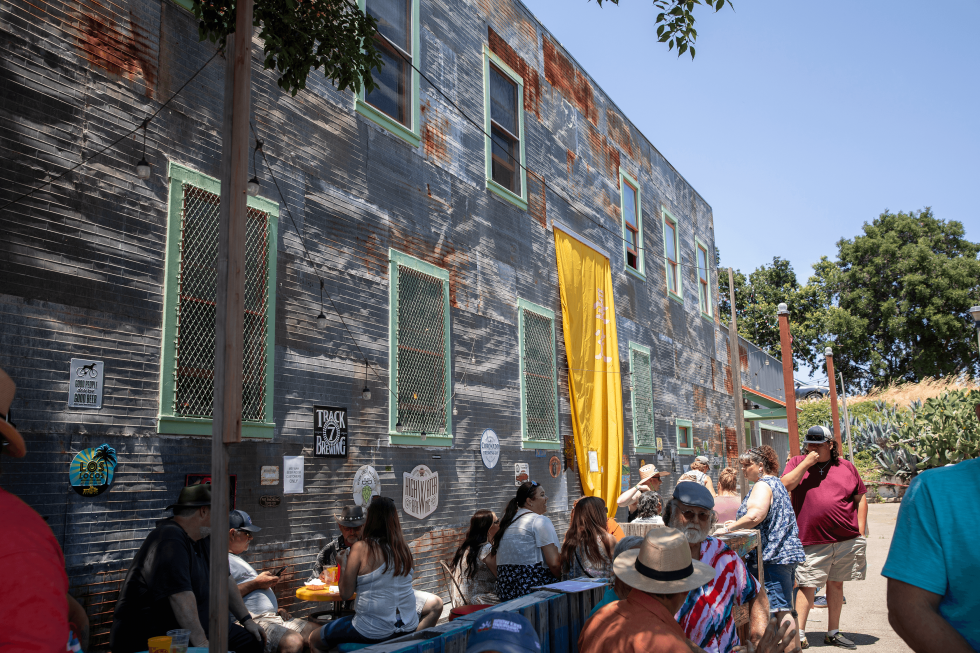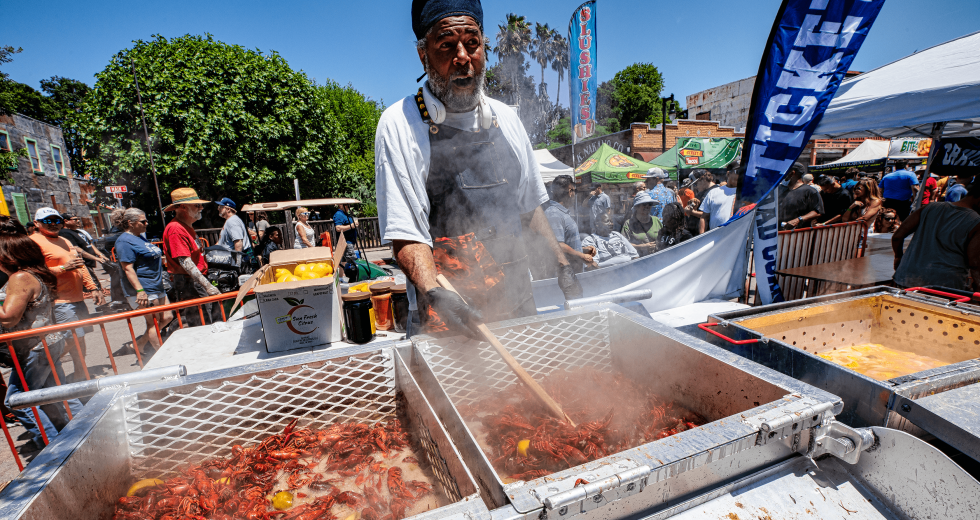Isleton’s Crawdad Festival — a defining event from the mid-1980s to the late 2000s for the tiny city along the Sacramento River — returned to Main Street for the first time in 14 years on June 17-18, swelling the city of less than 800 residents to an estimated 60,000 over the two-day event.
Visitors head towards Main Street and the Isleton Crawdad
Festival on Saturday, June 17, the first one held there since
2009.

“They were moving it around, they took it out of Isleton,” says Jami Hollis, events director with JMH Events, describing the years the festival didn’t happen. “It’s been quite a while since the ‘official’ product festival in Isleton has taken place.”
Isleton’s Crawdad Festival returned to Main Street for the first
time in 14 years on June 17-18.

Past festivals starting in 1985 were run by varying entities, often lost money and faced lawsuits while drawing upwards of 100,000 people (estimates tend to widely vary) before the event’s long hiatus. Other events, such as 2019’s Isleton’s Summer Fest, sporadically attempted to fill the gap.
Sacramento sibling act Magical Rock Band, or MRB, performs
Saturday, June 17, during the Isleton Crawdad Festival.
Organizers emphasized adding more entertainment options for the
2023 festival.

With historic Isleton celebrating its 100th anniversary of cityhood this year, the timing seemed right for the reprise, Hollis noted, and the national firm JMH Events took control with a new focus on attracting families and bringing in more entertainment options.
Festival attendees paid a $25 entry fee at the gate over the two weekend days, which included Father’s Day on Sunday. (Early birds could buy $15 tickets online until May 1, seniors paid $10 and kids under 12 were free.) Ticket holders were able to check out several performances and 60 food vendors offering Louisiana-inspired items such as barbecued oysters, turkey legs and fried alligator.
Barbecued oysters were on the menu at the Isleton Crawdad
Festival, prepared by Jose Cenceros and Jose Pena with Main
Street Concessions.

Isleton, located about 30 miles from Sacramento along Highway 160, is the sister city of Breaux Bridge, Louisiana, a city noted for its crayfish (crawfish, crayfish, and crawdads are different words for the same animal).
And, yes, there were the festival’s signature delicacy, crawdads, cooked up by Edward Youman, better known as Chef Lop. The tomato-red boiled shellfish sold for $25 a pound or $40 for two pounds. Youman said he was cooking 10,000 pounds each day, imported from Louisiana as he prefers — though crawdads are prevalent throughout California waters.
The festival gave local businesses like the Mei Wah Beer Room the
chance to show off the city’s historic architecture.

“If I don’t get it from home, I don’t want to cook it,” he said. There were hours-long waits to receive an order of the popular crawdads, according to numerous posters on social media; and the shellfish, along with other items, faced shortages or were sold out by the end of both days.
Parking, always at a premium during past festivals, was a challenge this year, with several lots that were used in the past off-limits due to new owners or city development, says Jean Yokotobi, president of the Isleton Chamber of Commerce and a longtime resident of the delta city. Some private lots 10 blocks from Main Street were charging, and getting, $20 per vehicle.
Long-time Isleton resident Jean Yokotobi, president of the
Isleton Chamber of Commerce, helped run the chamber’s booth
selling margaritas during the festival.

While some problems remained, Yokotobi saw several positive differences from the last festival in 2009. “I was very pleased,” says Yokotobi, who helped run the chamber’s booth selling margaritas during the festival. “We saw a lot of families. We saw a lot of couples. We didn’t have one incident of drunkenness. And businesses made a lot of money. Even (sandwich shop) The McBoodery closed early both days because they ran out of product.”
While attendance was more than expected, organizers said they didn’t have any expectations going in on how the community would react to the event’s return, says Hollis. “We’re setting our expectations for next year,” she said.
Correction July 2, 2023: A previous version of this article misspelled the name of a restaurant. It is McBoodery, not McBootery.
–
Stay up to date on business in the Capital Region: Subscribe to the Comstock’s newsletter today.
Recommended For You

A Delta Legacy
Showcasing four-generation family businesses in the Capital Region
The Zuckerman family started a farming empire on a Stockton
island. Over 100 years later, they’ve branched out to several new
businesses but have stayed true to the crops that started it
all.

Tourism Out of Troubled Times
How lockdowns helped Californians discover local treasures of the past and present
As national and international tourism decreased during the
pandemic, regional visitation saw a boost. We profile three small
picturesque towns that got a big increase in visitors.

Big Shake-Up in the Delta’s ‘Little Paris’
Can fresh faces and new initiatives help rural Isleton thrive again?
Isleton has had its share of ups and downs over the years from municipal mismanagement to natural disasters. Now a new city manager and cohort of businessowners hope to see Main Street — and the town itself — thrive again.

Isleton’s Origins
Isleton dates back to 1874 when Josiah Pool established the town in the Sacramento-San Joaquin River Delta and constructed a wharf for steamboats that stopped twice daily on routes between San Francisco, Sacramento and Marysville. Meanwhile, Chinese laborers built the levee system that transformed the Delta’s peat soil into fertile farmland.

Gone Cray
Northern California has been overrun by an invasive predatory crustacean that is fundamentally changing our environment — the good news is, they’re delicious
How many generations does it take to belong somewhere? For the people born on U.S. soil, the law is pretty clear: only one. A pity then is the plight of the humble signal crayfish, pacifastacus leniusculus, who despite getting on more comfortably than even humans in the gentle climes of Northern California, is, and will seemingly always be, invasive.



